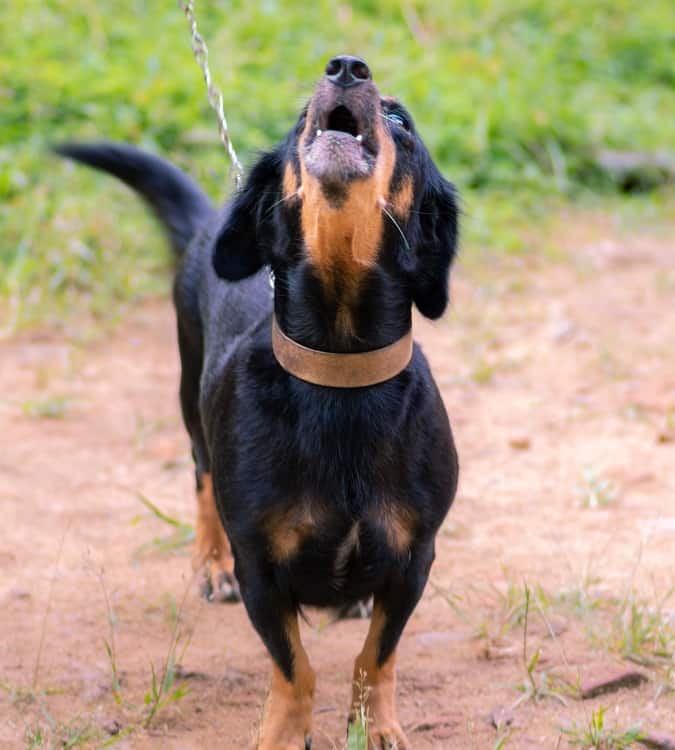It’s a known fact that Dachshunds LOVE to bark. ‘Love’ might also be an understatement.
But what about howling? Howling is another form of vocal communication used by dogs, some breeds more so than the others.
Passed on from their relatives – wolves, dogs use howling to get attention, announce their presence, communicate with others, or respond to high-pitched sounds like sirens or music.

And doxies, even though they do not look a lot like wolves, are still their descendants and no exception when it comes to howling.
So, why do Dachshunds howl?
Basic Instincts
Let’s start with your pup’s basic instincts. Dogs share genes with wolves, and we can often see our sweet domesticated dogs acting as wolves do.
In the wild, when wolf packs go hunting, a few of them stay back as a beacon to guide the members of the pack back home with howling – it is their way of showing devotion to their family.
Consider an option that your doxie might be howling while you are away to guide you, their loved one, home. If not taken care of, this can easily lead to separation anxiety.
If you notice them howling when a stranger approaches the house, or they see another dog, basically in any situation when barking is the ‘normal’ response, it might be their way of warning you of potential danger and protecting their home – another way of manifesting their basic instincts.
In these cases, you might want to consider DSCC – desensitization and counterconditioning, further explained later in this article.
Separation Anxiety
If you are often getting complaints from your neighbors about your Doxie howling while you are not home, it might be caused by separation anxiety.
This reason should be easy to identify as it happens exclusively when the dog is alone and is often accompanied by another sign like depression destruction or even peeing on the carpet or furniture.
If your dog is showing signs of separation anxiety, try leaving them with some toys to entertain them or comforting things to have while you are away, to prevent them from getting lonely, depressed and anxious.
If you notice your doxie getting anxious or nervous at the sight of you getting ready to go out, when you’re putting your shoes on, for example, try occasionally putting your shoes on, and then going back to whatever you were doing at home.
Over time, your doxie will stop connecting you putting your shoes on with you leaving the house.
Another thing you can do is spend as much quality time with them as possible when you are home.
Dogs are social creatures and need regular interaction with their humans, so let them spend time with you inside, go for walks and always reward good behavior!
Seeking Attention
Have you ever found yourself emotionally manipulated by your Dachshund?
Yeah, same here.
So it is no wonder to learn that your doxie might sometimes howl as a way of seeking attention – they howl, you think something is wrong and move all your attention to the pup in need – turns out they’re waiting for you, tail wagging, asking you to throw a ball.

To stop this kind of behavior, try teaching your pup two things: that howling doesn’t work even if it did until now, and that silence and patience do work.
Once your super vocal doxie learns that howling makes them invisible and silence gives them all the good stuff, you will have a quiet, well-behaved pup by your side.
So, how can you do this?
First, make sure to ignore the attention-seeking howling. As soon as they start making noise, stop any interaction with them.
Also keep in mind that just like little kids, attention-seeking dogs find even negative attention pleasing, so don’t even scold them!
The next step is to reward the pup for being quiet, as this is the behavior you want them to remember.
It is easy to forget to give attention unless they’re doing something, but try to remind yourself to occasionally give them treats and cuddles when they are quiet.
Make it a habit that they are not allowed to get food, treats, go out or play until they are sitting still and waiting in silence for at least five seconds.
If the pup starts howling, ignore them until they’re quiet for at least 5 seconds and then start paying attention to them again.
You can also try teaching them to be quiet on your command.
First, try to get them to bark or howl by knocking on the door or wall or exposing them to some other trigger, and at the same time saying ‘Speak!’.
Once they do, give them quick praise, but no treat. Then say ‘Quiet!’ or a similar word. The moment they stop howling or barking, give them praise and a treat.
Repeat this exercise, gradually prolonging the time they need to be quiet before getting the tasty treat.
Health Issues
If you hear your doxie howling and it doesn’t stop when you are with them, or they are not asking you to play, maybe they are trying to tell you they are hurt and in pain.
It is good to do a quick check-up to see if they are visibly hurt, but don’t ignore it even if you can’t see anything.
Take your pup to the vet to rule out any possible illnesses and injuries, or to get needed help.
Environmental Triggers
Being a little rascally as they usually are, your doxie might pick up a distant sound that is triggering them to howl.

If you see the pup looking in a certain direction while howling, try listening for a siren of an emergency vehicle, car alarm, or a howl of another dog that might be the cause.
Usually, this kind of howling does not represent a problem since the pup will stop as soon as the trigger stops.
However, it might represent a problem if the triggering sound is reoccurring frequently or even worse, is stressing your pup out causing fear and anxiety.
If that is the case, there are some methods you can use to help your pup get rid of the fear.
DSCC – Desensitization and Counterconditioning
If it is a frequently recurring trigger, this may turn into an excessive howling, and you may need to try DSCC – desensitization and counter-conditioning.
If the problem is in how your doxie feels about the trigger, it might not be enough to just teach them a different behavior but to change their motivation and feelings which are the root of the problem.
DSCC are common behavioral treatments developed by psychologists for behavioral problems that make dogs aggressive, anxious or afraid and are most effective when used together.
These complex treatments involve every-day training and gradual, planned progress. Even though your Dachshund is usually a quick learner, don’t be discouraged if it takes weeks or even months before you see any significant results.
The goal of desensitization is to eliminate or at least significantly reduce the inappropriate emotion-based reaction.
To do this, you will need a structured plan that involves gradually exposing your Dachshund to a less intense version of the trigger in order for them not to be instantly triggered by it.
Let’s say your doxie is triggered by sirens of emergency vehicles. What you want to do is start exposing them to the sound, but make it quieter and shorter-lasting.
It will probably take some time, but when your pup gets used to this low-intensity trigger, meaning the least scary version of it, you will slightly start increasing the intensity.
This process might take months even, but if done correctly, you will have a happy pup who won’t be stressed out by the trigger anymore.
Counter-conditioning basically means teaching your pet to have a good feeling towards the trigger instead of a bad one.
This is done by linking the trigger with something good, like a favorite treat (or, even better, a special treat that they get only in these situations), creating a pleasant emotional reaction.
With enough repetitions, your pup will learn that whenever the trigger appears, something nice will happen. Over time, howling will stop and either a neutral or positive emotional reaction will be created.
These methods require patience, discipline and time, but if used correctly, they guarantee a happy pup.
Conclusion
Howling is a normal dog behavior, that is literally written in your dachshund’s genes.
If it is an occasional occurrence, there is no need to try and stop it. It can be lovely to have a dachshund around who likes to sing with you.
However, if you notice your pup howling out of the ordinary situations, you should always identify the cause so that you can react accordingly.
Make sure to check your pup for any possible injuries or signs of pain, so that you can take them to the vet to get needed help.
But if you notice unnecessary and continuous howling due to attention-seeking, separation anxiety or environmental triggers, there are ways for you to react and help your doxie get rid of this habit.
If the cause is attention-seeking or separation anxiety, there are simple methods you can use to help your doxie not get anxious and stressed.
Spending quality time with them before you leave, and leaving them with some toys to entertain themselves while you’re gone should do the trick.
If the cause is environmental triggers that are making your doxie afraid or aggressive, you might need to resort to DSCC methods.
If your doxie is stubborn and these methods don’t seem to be working, never resort to solutions like yelling, physical punishment or use of control collars.
These methods punish your doxie for howling, but do not address the root of the problem.
In case of a headstrong doxie, a few sessions with a professional animal behaviorist or a dog trainer should help!
